Projects & Programs - Green Infrastructure Program
Robinson's Branch Green Infrastructure Project
Project Funding Source: NJDEP 319(h)
The Robinson's Branch stream is a tributary of the Rahway River in northern New Jersey. The Robinson's Branch watershed is in the Townships of Clark, Westfield, Scotch Plains, Edison, Woodbridge, and the City of Rahway. It includes the Clark Reservoir and Milton Lake.
Rutgers Cooperative Extension, the Township of Clark, and the City of Rahway have partnered to install projects in the watershed that demonstrate green solutions for reducing stormwater runoff and nonpoint source pollution.
Project partners have installed rainwater collection systems (known as cisterns and rain barrels), rain gardens, and permeable pavements that allow water to move through the material and soak into underlying soils. These types of "green infrastructure" projects are environmentally friendly, sustainable, and cheaper than traditional "grey infrastructure" practices that use gutters, basins, and pipes to transport polluted stormwater to local streams, rivers, and lakes.
City of Rahway Projects
Through the Rahway Rain Garden Project 17 homeowners in Rahway had a portion of their yards transformed into customized, professionally designed rain gardens, as part of a comprehensive plan to reduce street flooding and improve water quality in the Robinson’s Branch Watershed in Rahway.
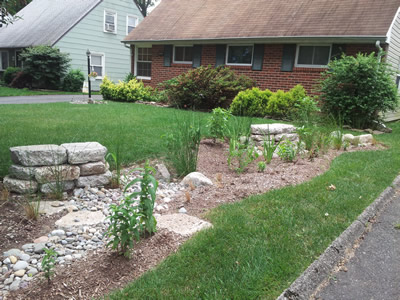
Rahway residential rain garden
Rain gardens are constructed with specially designed soil that helps excess stormwater seep into the ground, rather than running off from lawns, driveways, or roof drains. The goal of this project was not only to help reduce stormwater runoff but also show how rain gardens can contribute attractive landscape features to a residential home.
In addition to flood mitigation, rain gardens provide natural filtration that helps prevent urban runoff from adding pollutants to local waterways.
Because they are typically planted with native perennials, rain gardens also help to reduce the cost of yard maintenance. Compared to lawns, which require constant care during the growing season, the typical rain garden thrives with no fertilizer, herbicides, pesticides, or water other than rainwater or snowmelt.
The Rahway Rain Garden Project is a program of the Rutgers Cooperative Extension of Union County, the Water Resources Program, and the City of Rahway.
Participants were enlisted for the project in 2013 and 2014. The program was limited to Rahway residences within the Robinson’s Branch watershed.
Educational signage on Briarcliffe Avenue
Many of the rain gardens were designed with used concrete for hardscaping.
The gardens were designed under the Water Resources Program by Tobiah Horton, an Extension Specialist and Assistant Professor in the Department of Landscape Architecture at Rutgers University, and Richard Alomar, also an Assistant Professor in Landscape Architecture at Rutgers.
Township of Clark Projects
Clark Township installed a sustainable car wash that uses harvested rain water to wash cars and a rain garden to help remove dirty runoff. Stormwater runoff from the Public Works building is collected in a 5,000 gallon cistern. With the help of a booster pump, harvested stormwater is used to wash cars. Cars are washed on the wash pad where the dirty runoff flows to a rain garden. Runoff from the car wash flows to a rain garden located on the Arthur L. Johnson High School's property. Pollutants in the runoff are captured and filtered by the rain garden before the runoff discharges to the Robinson's Branch stream. This car wash is helping to save water, reduce stormwater runoff, and reduce pollution to the Robinson's Branch stream and Rahway River.
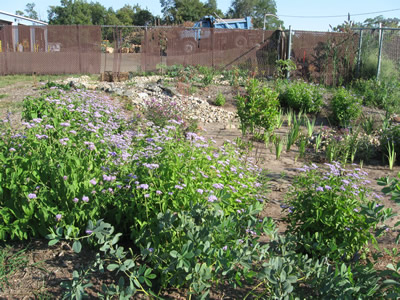
Arthur L. Johnson High School rain garden
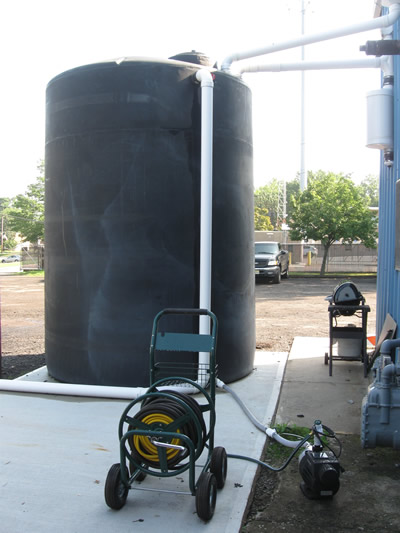
Clark Township Department of Public Works cistern
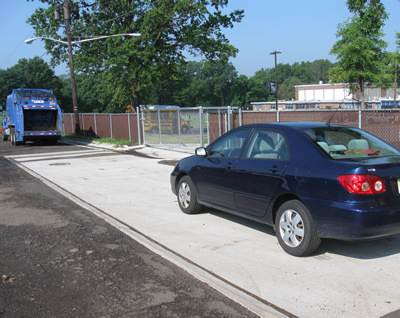
Clark Township Department of Public Works car wash pad
In Clark's town hall parking lot, porous asphalt in the parking spaces allows rain to soak into the ground. Notice when it is raining the porous asphalt on the left looks dry, while the conventional asphalt in the driving lane looks wet.
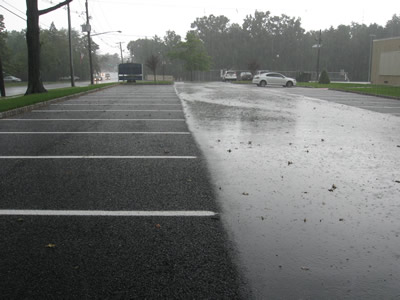
Porous asphalt at the Clark Township Town Hall parking lot
For more information on this project contact Michele Bakacs, Environmental and Resources Management Agent with Rutgers Cooperative Extension at bakacs@njaes.rutgers.edu.